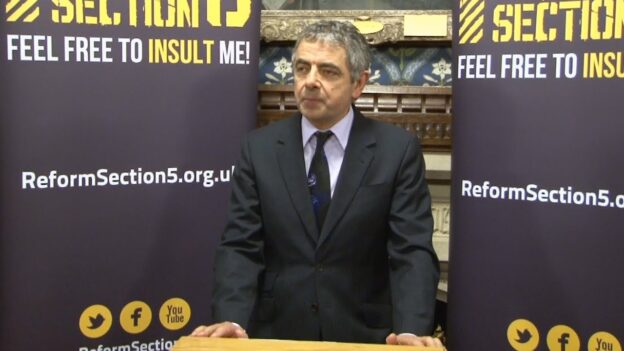At the crossroads of legislation and liberty, the push and pull between the right to express oneself and the responsibility of society to ensure harmony have often been contentious. The debate around Section 5 in the UK and its subsequent reform underscores this tension. While ensuring protection against discrimination and violence is imperative, delineating the boundary between hate speech and free speech is not always straightforward. Here, we embark on a journey through this legislative transformation, delving into the philosophical foundations and real-world implications of free speech.
Contents
Reform Section 5 Campaign
“Insulting words or behaviour” were outlawed by Section 5, and had a chilling effect on free speech right across the UK, in a wide range of communities. The law rightly protected the people of the UK against unjust discrimination, incitement and violence. But there was an issue in regards to what was and who qualified it as “insulting” and “rude”.
Rowan Atkinson at Parliamentary Reception 2012
Précis
Rowan Atkinson, a revered figure in entertainment, passionately addresses the subject of free speech, emphasizing its supreme value just after the basic necessities of life. He brings to light instances where free speech has been suppressed due to its “insulting” nature and underscores the flaw in criminalizing speech based solely on its potential to offend. Referencing absurd cases and drawing parallels to a comedic skit he was once part of, Atkinson calls attention to the danger of this new intolerance. He emphasizes confronting and debating controversial topics is more beneficial than silencing them. Citing President Obama, Atkinson argues that the antidote to hate speech is more speech. He advocates for reforming laws that stifle expression and champions the principle that the public should be more resilient to offensive remarks rather than outlawing them.
Section 5 Reformed (2014)
The Reform Section 5 campaign succeeded in its aim to amend Section 5. After a lengthy campaign, which included support from celebrities including Rowan Atkinson and Stephen Fry, the then Home Secretary Theresa May eventually agreed. The change is now incorporated in Section 57 of the Crime and Courts Act 2013 which came into force on 1 February 2014.
From Legislative Evolution to the Essence of Expression
The reformation of Section 5 is a testament to society’s evolving understanding of free speech. With the removal of “insulting words or behaviour” from its purview, it marks a significant stride in the direction of unfettered expression. But to appreciate this reform, we need to delve deeper into the essence of free speech. It’s not just about saying what one believes, but it’s an emblem of democratic values, the cornerstone of critical thought, and the heartbeat of societal progress.
Expanding on the Argument and Promoting Free Speech
In the ever-evolving tapestry of human civilization, the unbridled freedom to express, think, and challenge has always been a central thread. From the political agoras of ancient Athens to the digital forums of the modern era, the precept of free speech is enshrined as an inalienable human right, instrumental in shaping democracies and preserving individual liberties. A profound examination of literature’s role in this matrix reveals it as more than just an art form; it is a powerful conduit of free speech, a mirror to society, and a mechanism for change. Censoring literature not only impedes the propagation of ideas but fundamentally undermines the spirit of intellectual and societal growth.
The Philosophical Foundations of Free Speech
Before delving into the intricacies of literature’s role, one must understand the philosophical underpinnings of free speech. Philosophers like John Locke posited that humans, in their state of nature, possess certain inherent rights and that the freedom of expression is paramount among them. Immanuel Kant further elaborated on this, suggesting that public discourse’s autonomy is a requisite for enlightenment, propelling societies out of self-imposed immaturity.
Literature as the Vanguard of Free Expression
Literature stands as a testament to the breadth and depth of human experience. From the epics of Homer that reflected the ethos of ancient Greece to the post-colonial narratives of Ngũgĩ wa Thiong’o that challenge the established orders, literature serves as society’s collective conscience. By offering readers a myriad of perspectives and worlds, it inherently advocates for open discourse, empathy, and critical thinking.
The Historical Consequences of Censorship
History is replete with instances where censorship has acted as a tool for authoritarian regimes to maintain control and suppress dissent. The Catholic Church’s Index Librorum Prohibitorum, the Soviet Union’s suppression of Solzhenitsyn, or the Nazi book burnings are grim reminders of the lengths to which powers will go to stifle challenging narratives. Such instances not only rob society of intellectual treasures but also create an environment of fear and conformity.
The Contemporary Implications
In the modern context, with the rise of the digital age and social media, the battleground of free speech has shifted but remains as pertinent as ever. The cancel culture phenomenon, where individuals are ostracized for controversial opinions, reflects a new kind of self-imposed censorship. By stifling uncomfortable narratives or unpopular opinions, we are inadvertently creating echo chambers, depriving ourselves of a holistic understanding of issues.
Conclusion
In understanding the significance of free speech, it is crucial to consider both its historical underpinnings and its contemporary relevance. The reformation of Section 5 in the UK stands as a beacon of progressive legislation, emphasizing the importance of open discourse and challenging outdated norms. Literature, in its myriad forms, encapsulates this spirit, pushing boundaries and encouraging introspection. If societies are to thrive and progress, it is vital to ensure an environment where voices are heard, narratives are shared, and ideas are debated. As we reflect upon the journey from the agoras of ancient Athens to the digital forums of today, we are reminded of the age-old wisdom – to silence a voice is to stifle the very essence of human progress. After all, it isn’t just about the right to speak; it’s about the right to be heard, understood, and to contribute to the ever-evolving tapestry of human civilization.
